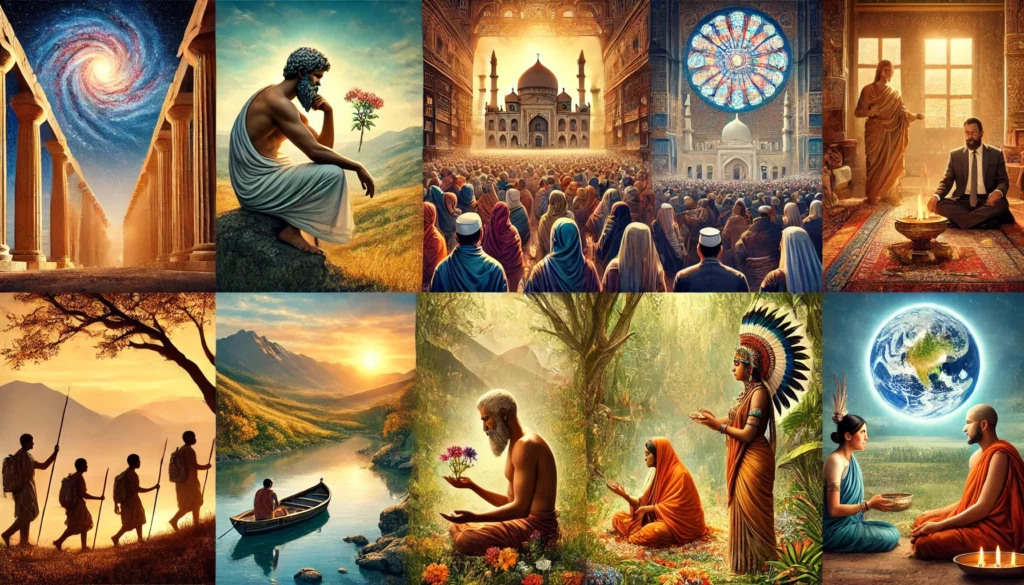
Gratitude is a universal value found at the core of most religious traditions, as most religions view life’s blessings as gifts from a higher power.
In Christianity, Gratitude is often expressed as a fundamental response to God’s grace. The Bible encourages believers to “Give thanks in all circumstances; for this is God’s will for you in Christ Jesus” (1 Thessalonians 5:18).
Islam similarly places great importance on Gratitude, known as “shukr” in Arabic. The Quran frequently mentions the significance of being grateful to Allah. It states, “If you are grateful, I will surely increase you [in favour]” (Quran 14:7).
In Judaism, Gratitude is deeply embedded in daily prayers and practices. One of the foundational prayers, the “Modeh Ani” recited every morning, begins with the words: “I offer thanks before you, living and eternal King.” This reflects the tradition of starting each day with Gratitude to God for the gift of life.
In Hinduism, “Shukrana” signifies the importance of appreciating the divine within and the blessings received in life. In the Yoga Sutras, Patanjali writes, “Santosha” which means contentment or Gratitude, is one of the niyamas (observances) that lead to inner peace and spiritual growth.
In Buddhism, Gratitude is closely linked to mindfulness and the appreciation of the present moment. Thich Nhat Hanh, a renowned Buddhist teacher, beautifully expresses this sentiment: “When we practice mindfulness, we always return to the present moment, where we can touch the wonders of life and be nourished by them. With mindfulness, we can recognize the presence of those who love and support us, and we feel deeply grateful.”
Indigenous traditions often express Gratitude through rituals and ceremonies. African religions celebrate life’s blessings through harvest festivals and offerings to ancestors, expressing Gratitude for their guidance and protection.
The famous professor and theologian Henri J. M. Nouwen said
“Gratitude as a discipline involves a conscious choice. I can be grateful even when my emotions and feelings are still steeped in hurt and resentment. It is amazing how many occasions present where I can choose Gratitude instead of a complaint.
The discipline of Gratitude is the explicit effort to acknowledge that all I am and have is given to me as a gift of love, a gift to be celebrated with joy.
Gratitude can help cultivate humility by reminding us that we are not self-sufficient and that our blessings are not guaranteed. It also provides perspective, allowing us to focus on the positive aspects of our lives. Gratitude has been shown to have numerous psychological benefits, including increased happiness, reduced stress, and improved relationships.
Quotes
Buddhism
“Whoever is grateful, and remembers the past, and is mindful of the future, and delights in the present, such a wise person is indeed blessed.”
– The Dhammapada
Islam:
“The best of people are those who are grateful to Allah.”
– Hadith
Judaism:
“It is good to give thanks to the Lord, to sing praises to your name, O Most High.”
– Psalm 92:1
“The world stands on three things: justice, truth, and peace. But some say: on justice, truth, and gratitude.”
– Pirkei Avot 3:11
Christianity:
“Enter his gates with thanksgiving and his courts with praise; give thanks to him and praise his name.”
– Psalm 100:4:
Hinduism:
“The wise man is grateful to the Supreme Lord for all that he receives.”
– Bhagavata Purana
Indigenous Traditions
“Let us be grateful to the ancestors for giving us life; let us be grateful to the Earth for giving us food; let us be grateful to the Great Spirit for giving us a
– Native American Proverb
Literature and Philosophy:
“Let gratitude be the pillow upon which you kneel to say your nightly prayer.”
– Maya Angelou, poet


